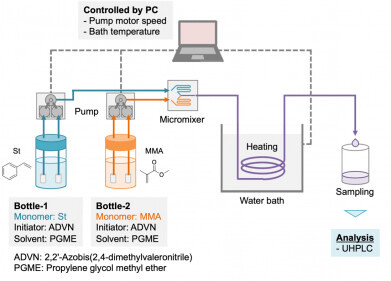Research News
UK team confirm milk pasteurisation does inactivate influenza viruses
Jun 18 2024
Concerns about a highly pathogenic strain of avian influenza virus or ‘bird flu’ in American dairy cattle and its potential for transferal to humans, prompted a research collaboration between the MRC-University of Glasgow Centre for Virus Research, the University of Edinburgh’s Roslin Institute, the Pirbright Institute and the UK Animal & Plant Health Agency, to investigate whether pasteurisation temperatures, if applied for industry standard times, should effectively inactivate H5N1 influenza viruses in cows’ milk and render it safe to consume. This ongoing outbreak – the first time a virus of this sort has spread in cattle – led to high levels of potentially dangerous virus being shed into milk in some parts of the USA, raising concerns including the risk of the virus being able to adapt to humans and cause a new pandemic.
Ed Hutchinson, Senior Lecturer at the MRC-University of Glasgow Centre for Virus Research and the corresponding author of the study, said: “Given the worries surrounding the H5N1 outbreak in dairy cattle in the United States, and the discovery of the virus in cows’ milk, we urgently needed to answer the question of whether pasteurisation made milk safe.
“We have now rigorously tested this, showing that the temperatures used in pasteurisation should rapidly inactivate all influenza viruses. However, we also found that influenza viruses remained infectious in ‘raw’ (unpasteurised) milk. Raw milk is already known to carry a variety of pathogens, and we would particularly caution people against drinking it in areas of the USA where cattle might be infected with H5N1 influenza. Human infections with H5N1 influenza viruses have the potential to be very dangerous and they also give the virus more opportunities to adapt to transmitting between humans. Pasteurisation of milk in affected areas is a good way to minimise these risks.
He added that assessments on unpasteurised cheeses, raw milk yoghurt or other unpasteurised dairy products would progress understanding of how this virus is spreading among cattle in the USA, and given the global distribution of H5N1 in birds, whether similar outbreaks could take place in farmed animals elsewhere in the world.
Dr Jenna Schafers, a PhD student at the University of Edinburgh Roslin Institute and a joint lead author of the study, said: “This team effort from a consortium of researchers across the UK has shown that pasteurisation temperatures rapidly inactivate H5N1 influenza viruses, which is reassuring. Our ability to respond quickly to this urgent question highlights the importance of collaboration across organisations to rapidly respond to novel issues, which is of particular importance in the post-pandemic era.”
More information online
Digital Edition
Lab Asia 31.6 Dec 2024
December 2024
Chromatography Articles - Sustainable chromatography: Embracing software for greener methods Mass Spectrometry & Spectroscopy Articles - Solving industry challenges for phosphorus containi...
View all digital editions
Events
Jan 22 2025 Tokyo, Japan
Jan 22 2025 Birmingham, UK
Jan 25 2025 San Diego, CA, USA
Jan 27 2025 Dubai, UAE
Jan 29 2025 Tokyo, Japan




.jpg)














